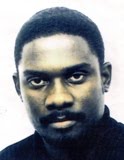As a youth I took an interest in American history and read about the works and philosophy of Martin Luther King. Many things about his principle of human emancipation, peace and universal brotherhood seemed to be a practical application of Christ's doctrines. I was also attracted to the philosophy of Mahatma Ghandi the Indian Nationalist. Before reading about the activities of Reverend King, I simply had no interest in politics and humanity. His writings jolted me into a cathartic response which is today the basis of most of my activities. I took freedom for granted. I never felt that there was oppression anywhere and that the events in South Africa and Palestine and America were the complaints of perennial losers. Was I wrong.
The speeches of Mahatma Ghandi and those of Martin Luther had a profound effect on my youthful mind. An extract from a letter from King said;
"History is the long and tragic story of the fact that the privileged groups seldom give up their privileges voluntarily. Individuals may see the moral light and voluntarily give up their unjust posture: but as Reinhold Neibuhr has reminded us, groups are more immoral than individuals."
It made me think and delve more into his philosophies. Many years later in Nigeria we had to cross such a bridge with the sit tight military rulers. King had said:
"We know through painful experience that freedom is never voluntarily given by the oppressor; it must be demanded by the oppressed."
In that winter of our own discontent some years later, Nigerians were unprepared for the sacrifices necessary to demand freedom. We had few people like King or Ghandi or Mandela to lead and inspire us. No, we only had fat contractors, laid back intellectuals, content traditional rulers and a carefree middle/upper-class in which I was brought up. The words of Dr King in this regard were damning:
"Shallow understanding from people of goodwill is more frustrating than absolute misunderstanding from people of ill will. Lukewarm acceptance is more bewildering than outright rejection"
In this reference to moderate white Americans and their lukewarm concern to the struggles of the blacks for racial equality, it also touched the national soul of Nigeria and most African countries. None helped our black brothers in America in their struggle, and instead, suppressed the agitations of their own people.
I was elevated by a statement in another speech which would become credo for me as I developed. He said;
"But there is something that I must say to my people, who stand on the warm threshold which leads into the palace of justice: in the process of gaining our rightful place, we must not be guilty of wrongful deeds. Let us not seek to satisfy our thirst for freedom by drinking from the cup of bitterness and hatred. We must forever conduct our struggle on the high plane of dignity and discipline. We must not allow our creative protest to degenerate into physical violence"
I could see from his thesis that he was enamoured by Mahatma's system of non-violent protest, which is often the tool of the elderly revolutionary. I read on;
"Again and again, we must rise to the majestic heights of meeting physical force with soul force. The marvellous new militancy which has engulfed the Negro community must not lead us to a distrust of all white people, for many of our white brothers, as evidenced by their presence here today, have come to realise that their destiny is tied up with our destiny. And they have come to realise that their freedom is inextricably bound to our freedom. We cannot walk alone."
The last words stuck with me like a leech. Over and over again, I would think about the meaning of the phrase "We cannot walk alone". It became a personal credo for me. It agitated the humanistic instinct inside of me and was to form a part of my activities and identity.
Reading about Dr King and Ghandi made me think about my own country, and about Africa. Why did we not have enough of such men in our own country? Universal people of inspiration. I had heard of Kwame Nkrumah and of course, our own Awolowo, Azikiwe and Ahmadu Bello. I was looking for people whose activities and philosophies transcended tribal, national and continental limitations. Was it something in our submissive or cowardly laissez-faire attitude that allowed us to be so subject to external domination? Why could we not ever stand for something and stand for long? Why were we always so afraid to request for change if it would bring progress?
Later in our national history, this discrepancy in our psyche would lead us to allow a single dictator to almost re-write the history of Nigeria. When we fought back, it was a little, and rather late. It took the hand of God and one important personal sacrifice by the most unexpected of people to bring peace into our nation. I considered that I had to be a part of that generation that would seek positive change.

Man of contrast. This is truly inspiring. We pray for more men like Reverend King who will not only talk about change and eradication of oppression, but take action!! God bless you.
ReplyDeleteAmen Sis, and God bless you too.
ReplyDelete